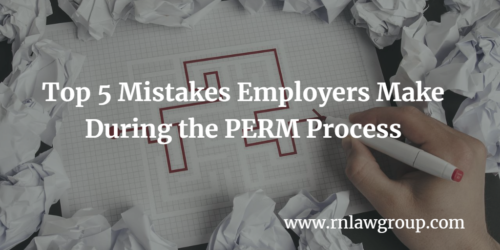
Top 5 Mistakes Employers Make During the PERM Labor Certification Process
1. Not understanding the purpose of PERM:
Employers starting PERM for the first time often do not understand what the process entails. For example, it is not uncommon for employers to be surprised that the company must conduct recruitment for the sponsored position.
The process will be much smoother from the get-go if the employer understands the following: An employer filing a PERM Labor Certification must demonstrate to the Department of Labor (DOL) that U.S. workers will not be displaced by hiring a foreign worker to fill a permanent position with the company. Therefore, employers must conduct a series of recruitment activities to adequately test the U.S. labor market for able, willing, qualified, and available U.S. workers. If no such workers are found, the employer may file a PERM Labor Certification on behalf of the foreign worker.
Understanding this fundamental aspect of PERM will also help employers understand other important aspects of the process (e.g., providing job details and minimum requirements for the position, reviewing qualifications and conducting interviews of U.S. applicants). Employers should work closely with their immigration attorney to ensure that the process is explained in detail before the process begins.
2. Overstating / tailoring requirements for the job opportunity:
The DOL limits the requirements for the sponsored position to the employer’s actual minimum requirements for the job. These requirements can include the employer’s education, experience, and special skill, license, and/or certification requirements. Further, the requirements for the position should not be unduly restrictive or tailored to the beneficiary because this can be seen as disadvantaging U.S. workers by unfairly restricting the applicant pool.
Employers who overstate the requirements for the role or tailor those requirements to the beneficiary’s qualifications may have to answer to the DOL in the form of a PERM audit.
Under these circumstances, the employer must be prepared with a business necessity statement to demonstrate that the job duties and requirements (1) bear a reasonable relationship to the occupation in the context of the employer’s business and (2) are essential to perform the job in a reasonable manner. Basically, the DOL will want evidence demonstrating the special business need for the requirements provided. If the employer cannot provide the requested evidence, the PERM application may be denied.
It is important that employers understand the difference between “PERM recruitment” and “real world recruitment” before undertaking this process.
3. Not listing all employee qualifications on ETA Form 9089:
The foreign worker must meet all minimum requirements listed on the ETA Form 9089 as of the date the PERM application is filed. Therefore, the foreign worker’s qualifications must be recorded on the application. This includes any education, experience, special skills, licenses, and/or certifications required for the position. The PERM will be denied if any qualifying information is not listed on the application. Employers who attempt PERM without assistance or who work with an inexperienced immigration attorney may not realize that this oversight can lead to a denial.
4.Overlooking typographical errors on ETA Form 9089:
PERM was implemented to streamline the labor certification process. Therefore, the DOL does not easily forgive errors on the application. In fact, even a minor typographical error can cause denial of your PERM application. It is imperative that the employer or employer’s attorney thoroughly review substantive and non-substantive portions of the application before submission to the DOL.
5.Improper handling of recruitment:
DOL regulations require that employers conduct a series of recruitment activities to adequately test the U.S. labor market for able, willing, qualified, and available U.S. workers. The employer must follow specific steps when posting advertisements for the sponsored role and must pay close attention to dates and timelines. One misstep can cause a major setback in the case.
Also, employers must properly document all recruitment efforts made. This means that dated copies of all advertisements must be taken and kept in an audit file. The employer may also have to conduct interviews of applicants. Employers sometimes do not understand which applicants need to be considered and what documentation needs to be kept (e.g., email correspondence between the company and the applicant; copies of resumes received; lawful job related reasons for rejecting the U.S. worker).
Improper handling of recruitment by the employer leads to an incomplete audit file, which can have major repercussions at the time of filing or in the event of an audit.
Employers attempting PERM on their own or with an inexperienced immigration attorney can lead to mistakes that may cost a company time and money. It can also cause major issues with the foreign worker’s ability to continue work in the U.S. for the company. Therefore, if your company is initiating the PERM-based green card process for a foreign worker, it is important to speak with a qualified immigration attorney to provide guidance through this process.
By: Krystal Alanis
Krystal Alanis is a Partner at Reddy Neumann Brown PC with over 10 years of experience practicing U.S. business immigration law. Krystal manages the firm’s PERM Labor Certification Department, where she oversees all EB-2 and EB-3 employment-based green card matters. Krystal guides clients from a variety of industries through the maze of the PERM Labor certification process and has handled thousands of PERM applications throughout her career. Krystal guides employers through the I-140 and Adjustment of Status process, and assists clients with temporary work visas. Further, she oversees the firm’s I-9 compliance team where she advises employers regarding Form I-9 Employment Eligibility Verification requirements and conducts internal audits of a company’s I-9 records, processes, and procedures. Additionally, Krystal represents clients in Form I-9 U.S. Immigration and Customs Enforcement (ICE) inspections (Notice of Inspection). Krystal successfully settled a claim with ICE over Form I-9 substantive paperwork violations that led to an 88% reduction in civil fines for her client.
Reddy & Neumann has been serving the business community for over 20 years and is Houston’s largest immigration law firm focused solely on US. Employment-based immigration. We work with both employers and their employees, helping them navigate the immigration process quickly and cost-effectively.

